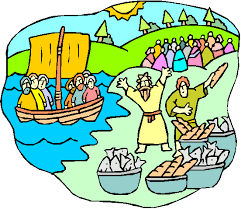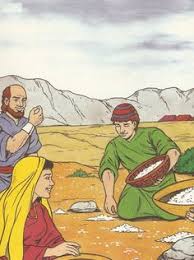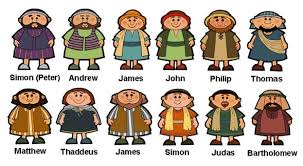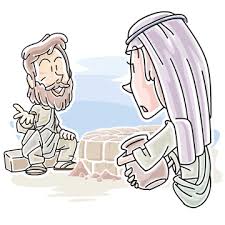John 6:30 –So they said to him, "Then what sign do you do, that we may see and believe you? What work do you perform?"
The crowd who ate the loaves and fish followed Jesus across the sea/lake to Capernaum. They caught up with him at the temple, where he was teaching.
At that time, Jesus told them to seek food that endures to eternal life. This spiritual food was available from the Son of Man, who has been 'sealed' or commissioned by Father God to be the bread of life and provide eternal life to all who believe in him.
 The people respond by asking for a sign or miracle which proves Jesus is the Messiah and that has been ordained by Father God.
The people respond by asking for a sign or miracle which proves Jesus is the Messiah and that has been ordained by Father God.
How do we explain this strange request in light of the recent miracle of the loaves and fish?
The answer lies in the fact that this new request is being made in the temple setting. The crowd no longer consists of just those from across the sea who at the loaves and fish. It also includes other Jews from Capernaum as well as the temple rulers.
As for the crowed that ate the loaves/fish and acknowledged Jesus as the Messiah, they were thinking of Jesus in terms of our present physical life. They expected the Messiah to be a leader who would overthrow Rome, restore Israel and provide them with a happy and comfortable existence here on earth. This was the Messiah they were willing to accept and support.
But Jesus rebuffs their attempt to make him an earthly Messiah and subsequently informs them that his kingdom is not physical, it is spiritual.
Just as earthly life depends upon earthly food, spiritual life depends on spiritual food. The Messiah has come to provide spiritual food by fulfilling/completing the ceremonial law and replacing it with the gospel. Through the plan set forth in the gospel message, the Messiah will become the spiritual bread which sustains eternal life.
This plan was a serious issue for the religious leaders of the day. So the request for a sign most likely came from the rulers of the temple. Despite the miracle of the loaves/fish (which they were no doubt aware of), they were demanding further proof/confirmation that Jesus was the true Messiah, because only Messiah had the authority to set aside the law and establish new religious doctrine.
The conversation that takes place in the next few verses may well have occurred between Jesus and the religious leaders, with the crowd watching.
John 6:31 – "Our fathers ate the manna in the wilderness; as it is written, 'He gave them bread from heaven to eat.'"
Not only do they ask for a sign of confirmation, they disparage the miracle of the loaves and fish by comparing it to the manna given to their forefathers. Their basis is found in the book of Psalms:
Psalm 105:40 - The people asked, and he brought quail, and satisfied them with the bread of heaven.
In essence this is what they are saying: The law came through Moses, and his message was confirmed by God who gave manna or 'bread from heaven' to millions of Jews, every day, throughout their wilderness journey of 40 years.
This is a greater miracle than Jesus feeding a single meal to a crowd of five thousand men plus women and children. If Jesus is the Messiah, and he wants us to believe his message, it must be confirmed with a greater sign than the miracle of the loaves and fish.
John 6:32-33 –Jesus then said to them, "Truly, truly, I say to you, it was not Moses who gave you the bread from heaven, but my Father gives you the true bread from heaven. For the bread of God is he who comes down from heaven and gives life to the world."
Again, the Jews are focused on the physical bread of this life (manna) and again Jesus patiently redirects their focus to the spiritual realm.
 The true 'bread from heaven' is not manna. Manna is simply another form of physical food which God provided for Israel to sustain their physical lives as they wandered in the wilderness. It had no spiritual power; it could never preserve the soul from death.
The true 'bread from heaven' is not manna. Manna is simply another form of physical food which God provided for Israel to sustain their physical lives as they wandered in the wilderness. It had no spiritual power; it could never preserve the soul from death.
Furthermore, manna did not come from 'heaven' as in the third heaven and throne room of God (II Corinthians 12:2-4). Manna came from 'heaven' as in the first heaven, meaning the air and clouds of Earth's atmosphere.
The true 'bread from heaven' is spiritual food which results in eternal life; it saves the soul from eternal death. God provided this true bread through his Son Jesus, who came down to earth from the third heaven. God gives the bread of heaven to the entire world – not only Jews, but Gentiles as well.
The phrase 'bread of heaven' is full of deep meaning:
- Since Jesus is the 'bread from heaven', the Jews can be assured that he is divine, because heaven is the dwelling place of God.
- Since Jesus is the 'bread from heaven' the Jews can be assured that Jesus has been with God from the beginning (John 1:1) and that he was present and assisted in the creation of the world (John 1:3).
- Since Jesus is the 'bread from heaven', the Jews can be assured that he possess all power, because heaven is the seat of all power and authority.
- Since Jesus is the 'bread from heaven' the Jews can be assured that Jesus has a divine commission from the Father to bring them the gospel message.
These Jews are either ignorant or stubborn when they esteem Moses greater than Jesus. Moses was simply a servant of God, while Christ is the Son (Hebrews 3:5-6).
John 6:34-35 – They said to him, "Sir, give us this bread always." Jesus said to them, "I am the bread of life; whoever comes to me shall not hunger, and whoever believes in me shall never thirst."
Does this request seem at all familiar to you? The phrase 'give us this bread' is very similar to the words of the woman at the well, who said, 'give me this water' (John 4:15). This indicates that, like the woman at the well, these Jews are beginning to receive spiritual understanding.
They are starting to realize that manna was not the true bread of heaven as they previously believed. They begin to consider the possibility that God has sent them a better kind of bread.
In the remainder of this exchange Jesus proceeds to reveal himself to the crowd and show that the blessings they hoped to receive were contained within himself and therefore they could only be obtained by belief in him.
In fact, the person who receives Christ and believes in him as the atoning sacrifice for sin will be perfectly satisfied spiritually. He will be free from the misery, guilt and burden of sin. His soul will be purified and reunited with God. He will enter into true rest and joy with God. He also finds solace, strength and victory in this life.
Sadly, this is where the similarities between this crowd and the woman at the well end. While the woman believed in Jesus and was satisfied, this crowd rejected Christ and went away spiritually unsatisfied/dead.
John 6:36 – "But I said to you that you have seen me and yet do not believe."
Jesus now goes on to chastise these Jews. He notes that they have 'seen me'. Of course, Jesus is not talking about physically seeing him in the flesh, he is speaking in spiritual terms. He is saying that the crowd saw or perceived that he was the Messiah. They were witness to his power. They saw that Father God had confirmed his ministry with miracles.
It is not a lack of evidence that causes them to reject Christ and his gospel. They have chosen to be spiritually blind. But despite their rejection, the work of Jesus will not be in vain.
John 6:37 – "All that the Father gives me will come to me, and whoever comes to me I will never cast out."
Although some people will reject him, Jesus has been guaranteed by the Father that his labor will not be in vain.
Isaiah 53:11 - He shall see the travail of his soul, and shall be satisfied: by his knowledge shall my righteous servant justify many; for he shall bear their iniquities.
Jesus promises that all who come to him will be accepted and cleansed by him. Notice how boundless and wonderful the mercy of God is – NOTHING you have done is so bad that it cannot be forgiven!
To 'come to him' simply means to believe on him. To believe implies that we recognize our need/sin, we have confidence Jesus can help us and we are ready to trust and submit to him.
 But just as in the case of this crowd, Jesus never forces anyone to accept him. The Spirit of God touches us offering to do a work of faith and repentance in our lives, but it is still our choice. All who accept are saved. Those who prefer the path leading to death are free to travel that road, although God will constantly reach out to save them.
But just as in the case of this crowd, Jesus never forces anyone to accept him. The Spirit of God touches us offering to do a work of faith and repentance in our lives, but it is still our choice. All who accept are saved. Those who prefer the path leading to death are free to travel that road, although God will constantly reach out to save them.
The phrase 'cast out' literally means 'thrust out of doors'. The reference is of a person in deep poverty and distress who, in desperation, knocks on the door of a nobleman's house in order to get relief. Rather than being cast out, he is welcomed into the house.
In the same way, Jesus assures us that when we knock on his door seeking relief, he will not shut the door in our face; he will kindly and lovingly welcome us into his kingdom no matter how sinful and vile we may be. In fact, he not only forgives our sin, he welcomes us as brothers and sisters and makes us children of his Father.
John 6:38 – "For I have come down from heaven, not to do my own will but the will of him who sent me."
This is a confirmation of the preceding statement, that we do not seek Christ in vain.
Jesus assures us that he came to earth to do his Father's business. He came as an agent of God or what we might call an ambassador. He came from the kingdom of heaven to settle the affairs between the great Creator and all of creation. The scope and purpose of his whole earthly life was to glorify God and to do good to men.
Therefore he never considered his own ease, safety or comfort. When the time came for him to lay down his life, he did so willingly.
John 10:17-18 - Therefore does my Father love me, because I lay down my life, that I might take it again. No man takes it from me, but I lay it down of myself. I have power to lay it down, and I have power to take it again. This commandment have I received of my Father.
Of course, we know that the Godhead is in perfect unity at all times. The will of Jesus was identical to that of the Father; he too desired for men to be redeemed.
John 6:39 – "And this is the will of him who sent me, that I should lose nothing of all that he has given me, but raise it up on the last day."
In other words, Jesus is not there to just introduce us to salvation, he is with us every minute of every day until we finish our earthly course. He guards our salvation until the final day – the Day of Judgment.
This is the will/desire/intention of God and as such, we can be sure that it will be done because Jesus is faithful and he has been given all power in heaven and on earth to accomplish his Father's will.
The last day is also known as the Day of Judgment. On this day, all of the dead will be raised. Their bodies will be changed and reunited with their spirits.
1 Corinthians 15:51-52 - Behold, I show you a mystery; We shall not all sleep, but we shall all be changed, in a moment, in the twinkling of an eye, at the last trump: for the trumpet shall sound, and the dead shall be raised incorruptible, and we shall be changed.
This is the comfort and hope of every Christian – someday Jesus will defeat the final enemy - Death (I Corinthians 15:54). Our sinful flesh will be transformed and we will live with the Lord forever!
John 6:40 – "For this is the will of my Father, that everyone who looks on the Son and believes in him should have eternal life, and I will raise him up on the last day."
Salvation consists of two parts. There is the gift of God, which was Jesus the Son, our redeemer. This is a free gift which God offers to every single person, because it is his will that none perish, but all come to a saving knowledge of the Lord. However, he will not force his will on us.
This brings us to the second part of salvation, acceptance of this free gift by each individual. In order to accept salvation, we must recognize our sin, and place our faith in his atoning work. This assures us of eternal life. At that point, Holy Spirit will come to dwell in our hearts and begin the life long process of sanctification.
Let me offer you some encouragement, relief and strength:
We see over and over again in the New Testament that the Jewish leaders chose spiritual blindness. They were unable to accept the fact that God was doing something new in their midst. As a result, they missed out on the amazing things God wanted to do in them, through them and for them.
I don't know about you, but I don't want to miss out on any of the blessings of God.
So I encourage you today to look at your own life, or 'wine skin' (Mark 2:22, Luke 5:37-38). God has promised an epic, world-wide, end time harvest of souls. But we can be sure it won't occur as it has in the past, because God never repeats himself. He is always doing something new.
Isaiah 43:18-19 - Remember not the former things, neither consider the things of old. Behold, I will do a new thing; now it shall spring forth; shall you not know it? I will even make a way in the wilderness, and rivers in the desert.
Let's be honest - the lost of this generation are different from generations past. Basic beliefs in Christian values no longer exist. If we want the fires of revival to ignite and burn, we must be willing to follow where Holy Spirit leads us, how he leads us and when he leads us.
The good news is that if we are willing (if we do NOT choose spiritual blindness), Holy Spirit will lead us into victories that we can't even conceive of right now. As long as we follow his leading, we don't need to worry about failing because he will make sure we are victorious. We don't need to worry about having enough strength/endurance for the task, because he will be our strength. With him, we cannot fail.
Here are some things to consider this week: Are you ready and willing to accept a new and different move of God in your life and ministry? Are you ready to leave your current spiritual comfort zone? Are you in a position to hear Holy Spirit speaking to you and to act on his instructions? Are you willing to seek Holy Spirit involvement/gifts in your life?












































